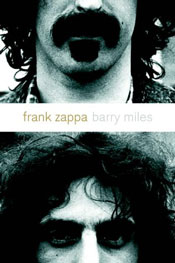
Zappa, A Biography
by Barry Miles
Atlantic Books

Why has the task of writing this book review come with such dread, avoidance, and general frittering away of time doing something, anything, other than actually writing the damned review?
I mean, after all, it’s not like I don’t like Zappa, right? Zappa is one of my all time favorite musicians, and his stand on free speech is unimpeachable, which is something else I hold him in high esteem for. He also had the balls to say “fuckit” to the commercial music industry AND his followers, and just play the goddamned music the way HE thought it should be played.
An awful lot of Zappa’s music is hard to listen to and even harder to play, and yet people respond to it with wild approval. No small accomplishment that, especially considering the fact that he succeeded financially while thumbing his nose at the very people and instrumentalities that were the ones who provided him with his positive cash flow all those years. The fact that he treated his fellow musicians with the financial contempt that he did is a problematic side issue here, but disregarding that thorny matter, you cannot deny that not only did he survive while swimming doggedly against the tide, but he actually thrived.
And this book was certainly well written, chock full of neato little facts and tidbits that I’d never come across before. I gobbled it down in pretty quick order just as soon as I got my grubby little mitts on it. It’s a good book, of that there can be no doubt.
And yet somehow, there was something with it that caused me to avoid writing this review like the plague.
A little voice in the back of my brain is saying that as far as Zappa is concerned, this book is acceptable, but perhaps there may be something amiss with the fellow who wrote the book?
Could be.
Or could it be the interaction between Barry Miles and his chosen subject matter?
After all, it’s no secret that Francis Vincent Zappa was a tremendously complicated snarl of self contradictions. Writing a book about a single person, one can be forgiven perhaps for taking the sensible position that that person is a single entity, hmm? Seems reasonable enough I suppose.
And, on top of that, isn’t Zappa the one who was famously quoted regarding rock journalism: “Rock journalism is people who can’t write interviewing people who can’t talk for people who can’t read.” Indeed he is. And although this book wasn’t written after an interview (Zappa died back in 1993), Barry Miles spent more than just a little time hanging out with Zappa. Ordinarily this would be construed favorably, by way of knowing one’s material better than other would-be biographers, but perhaps in this case that doesn’t apply? I don’t know.
Zappa absolutely refused to allow himself to be placed into a single box and instead followed his muse anywhere and everywhere it lead. If nothing else, Zappa was prolific. Over the course of his unfortunately shortened lifespan, he created a tremendous amount of material, much of it strongly at odds with the rest of it. And his allergic reaction against anything that might constitute a muzzle on his right to speak freely, no matter how slight, caused him to say some mighty strange things along the way. Zappa was an iconoclastic bastard, and that iconoclasm includes plenty of well-aimed swipes at the icon that is Francis Vincent Zappa.
And this, I think, may be where Barry Miles loses his grip on his subject matter a bit.
In particular, the squeamish (for Barry) subject of sex, and to a lesser extent, scatological matters in general.
Zappa just didn’t give a fuck and said whatever came to mind, and wasn’t the least bit shy about recording what he’d said (or what others said) and disseminating it far and wide.
Barry Miles, for reasons known only to himself, seems a bit preoccupied with explaining Zappa’s fascination with sex in all its myriad manifestations, and in several places launches off into fits of psychobabble that would better have been excised from the finished book. Some of this psychobabble has a surprisingly schoolmarmish tone to it as well. Barry does not approve of certain of Mr. Zappa’s little flights of fancy, and he’s not shy about sharing that disapproval with the rest of us.
The bottom line, as far as I can tell, is that Zappa simply HATED the thought that anybody for any reason, including himself, could keep him from speaking out on any subject. And, as a reaction to those attempts at censorship and self-censorship, he spoke right out loud about any damn thing that pleased him to speak about.
Barry Miles attempts to read far far more into it than that, every time the subject comes up, and I think he’s just plain wrong. So when you get to those parts of the book where Barry launches himself off into the wild blue yonder of why, you’re cordially invited to ignore all of it and just keep on reading the material, gleaning such facts as may be entrapped within the overlying matrix of explanatory codswallop, as you go along.
Barry also tends to side with those people who Zappa’s path crossed, and whose thoughts, words, or whatever, thereupon appear in the Next Installment of whatever project Zappa may have been involved in at the time, with nary a nod to the one who made the original remark in the first place. Many were the voices that were raised in complaint against such practices. After all, I said it, shouldn’t I be given credit AND recompense for what I said?
In a word, no. You should not.
Had Zappa not chosen to pluck your little pebble from the riverbank, it would have washed out to sea and disappeared right along with all the other anonymous little pebbles whose voices were never heard.
It was Zappa’s peculiar genius to be able to know exactly which little pebbles were worthy of him stopping to pick up and put in his pocket. Without his keen eye and ear, all of this stuff would have disappeared forever.
Zappa was a composer, and he looked at the world around him with a composer’s eye. It was Zappa’s senses that arranged things into the patterns he created. The individual bits were of little consequence to the overall tapestry that he composed. The arrangement was the thing, and only Zappa could come up with those arrangements.
This, for some reason, is an especially difficult subject for many people to properly grok. “Tough shit for many people,” seems to have been Zappa’s take on the matter.
But I think I’m beginning to ramble here. And, despite my earlier misgivings, I actually seem to have written a review of sorts anyway.
This is a Good Book. That it fails to deal with its subject matter perfectly is of no concern to anyone. It deals with it well enough, and it’s just loaded with neat stuff. I haven’t even touched on a vast treasure trove of additional subject matter that is contained within this book.
Barry Miles did his homework before writing this one, that’s for sure, and it shows.
But do not stop with this book, please. There’s other material out there. And, above all else, there’s Zappa’s material too. There’s an awful lot of it, and it speaks for itself in a strange and wonderful tongue. And be sure and come back and listen to the stuff you didn’t like every few years. It has an uncanny ability to sit there and wait for you to catch up to it, at which point it becomes the truly amazing stuff that it is. Some of it is horribly dated already, and for that there’s nothing you can do except appreciate it on its technical merits alone. But other parts of it are going to withstand the test of time in a way that only Great Art can, as fresh as the day it was created, generations from now.












